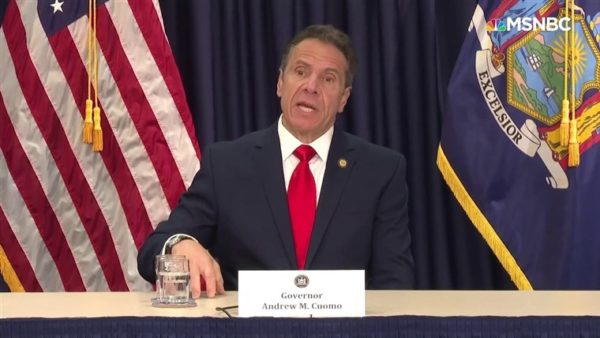President Donald Trump thinks all the states that need Congress to provide emergency relief funding are “run by Democrats in every case” and he charged it’s because they have been fiscally mismanaged.
That’s not the case. Numerous Republican-led states are facing coronavirus-caused financial crises, just like the Democrats.
Less than 24 hours after conducting an interview with The New York Post in which Trump made those remarks, the president took off to visit a mask-making plant in Arizona — a Republican-led state that by its own projections could face a shortfall ranging from $600 million to $1.6 billion by the end of the next fiscal year.
Arizona is not alone.
COVID-19 has led to dramatic decreases in revenue for state governments across the country — regardless of which party has its hand on the wheel. While many states are still crunching their numbers ahead of the next fiscal year, which begins in the summer for most, a handful of GOP-led states already have made clear the budget woes that face them.
The latest came on Tuesday afternoon when Ohio Gov. Mike DeWine, a Republican, announced that the past two months have led his state to miss its budget estimates by $776.9 million and that he is cutting $775 million in spending as a response. Those cuts, which include $210 million to Medicaid and $465 million in education spending, must be made within the next two months, he said.
“While we do not know what the coming months will hold, we do know that COVID-19 is here with us and will be here for quite some time,” DeWine said. “Nevertheless, it does not exempt us from balancing our budget, which we are legally obligated to do.”
Ohio has a rainy day fund, but DeWine decided against drawing from it.
With the COVID-19 outbreak shutting down large swathes of the economy, all sorts of revenue sources for the states have dwindled significantly, including sales, income and other taxes.
In Maryland, state budget officials outlined a nearly $3 billion shortfall they’re projecting in the final quarter of this fiscal year. As chairman of the National Governors Association, Maryland Gov. Larry Hogan, a Republican, has called for $500 billion in federal funding to state governments to account for budget shortfalls.
Hogan said in a recent statement that if Congress doesn’t fulfill that request, “states will have to confront the prospect of significant reductions to critically important services all across this country.”
Other GOP-helmed states are feeling the effects, too.
Exacerbated by the oil market collapse, Oklahoma budget officials told NBC News they’re projecting a shortfall of $1.3 billion. In Alaska, similar economic conditions, coupled with prior woes, have led budget officials to project total state revenue this year will be slashed nearly in half from $11.2 billion to $6.6 billion. The amount of revenue won’t recover to 2019 levels for at least the next decade, that projection shows.
In Arkansas, revenue forecasts now project a shortfall of more than $530 million, while in Wyoming, revenue shortfall projections range from $555 million to $2.8 billion through the end of fiscal year 2022. And in West Virginia, state revenue officials forecast a possible $500 million deficit as a result of the pandemic. A Moody’s Analytics report concluded the state’s financial picture could be worse, with a shortfall of up to $1.9 billion.
“I truly believe we’re going to have a backfill from the federal government,” West Virginia Gov. Jim Justice, a Republican, said at a press conference last month.
In Texas, state Comptroller Glenn Hegar, who provides revenue projections to state leaders, told The Austin American-Statesman that the Lone Star State will need to tap its rainy day funds to keep up with a shortfall amounting to billions, adding that although the state is well-positioned to do so through the end of this fiscal year, there is still great uncertainty surrounding the virus’ impact on his state’s bottom line.
Trump’s New York Post comments come as the next major legislative battle in Congress appears to be centered on whether emergency relief for state and local governments will be passed.
“It’s not fair to the Republicans because all the states that need help — they’re run by Democrats in every case,” Trump told the outlet. “Florida is doing phenomenal, Texas is doing phenomenal, the Midwest is, you know, fantastic — very little debt.”
Tuesday afternoon, Trump tweeted: “Well run States should not be bailing out poorly run States, using CoronaVirus as the excuse!”
“The elimination of Sanctuary Cities, Payroll Taxes, and perhaps Capital Gains Taxes, must be put on the table,” he said. “Also lawsuit indemnification & business deductions for restaurants & ent.”
On Capitol Hill Tuesday, Sen. Mitt Romney, R-Utah, held a chart reading, “Blue states aren’t the only ones getting screwed,” which showed a number of Republican-led states facing budget crunches.
Senate Majority Leader Mitch McConnell, R-Ky., initially said he’d prefer for states and localities to be able to declare bankruptcy rather than receive emergency funding. He later said any such legislation approving emergency funding to states and municipalities must also include a provision removing legal liability for companies that bring workers back amid the coronavirus outbreak — something House Speaker Nancy Pelosi, D-Calif., said Democrats would “not be inclined to” support.
States received $150 billion in emergency funding in earlier COVID-19 legislation, but the Treasury Department has said that money can only be used to cover costs directly associated with the pandemic, not on filling budget gaps.


